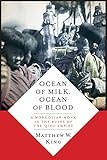Ocean of milk, ocean of blood : a Mongolian monk in the ruins of the Qing Empire / Matthew King.
By: King, Matthew W. (Matthew William) [author.].
Material type: BookPublisher: New York : Columbia University Press, [2019]Description: 281 .: photos 24 cm.Content type: text Media type: unmediated Carrier type: volumeISBN: 9780231191067 (cloth : alk. paper); 9780231549226 (electronic).Subject(s): Blo-bzang-rta-mgrin, 1867-1937 | Buddhism -- Asia -- HistoryAdditional physical formats: Online version:: Ocean of milk, ocean of bloodDDC classification: 294.3/923092 | B
BookPublisher: New York : Columbia University Press, [2019]Description: 281 .: photos 24 cm.Content type: text Media type: unmediated Carrier type: volumeISBN: 9780231191067 (cloth : alk. paper); 9780231549226 (electronic).Subject(s): Blo-bzang-rta-mgrin, 1867-1937 | Buddhism -- Asia -- HistoryAdditional physical formats: Online version:: Ocean of milk, ocean of bloodDDC classification: 294.3/923092 | B | Item type | Current location | Call number | Status | Date due | Barcode |
|---|---|---|---|---|---|
 Books
Books
|
American Center for Mongolian Studies | BQ942.L5825 K56 2019 (Browse shelf) | Available | 30722 |
Browsing American Center for Mongolian Studies Shelves Close shelf browser

|

|
No cover image available |

|

|

|

|
||
| BQ940 G83 B3813 2009 Bogdo Jebtsundamba Khutuktu, the last king of Mongolia : | BQ940 G83 B3813 2016 The Bogdo Jebtsundamba Khutuktu The last emperor of Mongolia: | BQ942. A15 K58 1999 Bakula Rinbu̇chi Tu̇vdėnchognor / | BQ942.L5825 K56 2019 Ocean of milk, ocean of blood : | BQ950 I587 D5513 2009 The Diluv Khutagt of Mongolia : | BQ950 I587 D5513 2009 The Diluv Khutagt of Mongolia : | BQ950. I587 L37 1982 The Diluv Khutagt : |
Includes bibliographical references and index.
Wandering -- Felt -- Milk -- Wandering in a post-Qing world -- Vacant thrones -- Blood.
"Eurasia's multiethnic empires began to crumble in the early twentieth century. In the ruins of the Qing, Russian, Austro-Hungarian, and Ottoman empires, hundreds of ethnic groups sought to secure their newly found sovereignty and to participate in the global economy. They did so most regularly by adopting the representative politics of nationalism and by seeking to join the world system of nation-states. Ocean of Milk, Ocean of Blood tells a new transnational story about historiography, Buddhism, community, and sovereignty through the first-person narrative of a remarkable monk working at the Tibetan-Mongolian frontiers of Russia and China, the polymath Zawa Damdin (1867-1937): a historian, mystic, logician, and pilgrim whose life and works uniquely straddled the Qing and its socialist aftermath, the monastery and the scientific academy, and regional monastic networks and traditions. Matthew King shows the centrality of Buddhism in revolutionary projects to modernize Inner Asia, especially through Euro-Russian discourses of international civil society. Zawa Damdin and his milieu used new concepts such as "Asia," "Mongolia," and even "Buddhism" (a newly minted world religion) to strategically reinvent their classical traditions. Braiding European impulses and imperatives with a Buddhism made to travel, Ocean of Milk, Ocean of Blood presents a deeply personal history of Buddhism in Asia, one that connects the necessary nodes of the collapse of the Qing, the mass purge of monastics in 1937, and the global diaspora of Mongolian and Tibetan refugees in the wake of state violence"-- Provided by publisher.


There are no comments for this item.